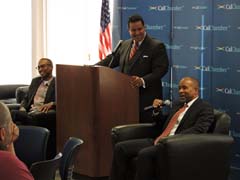
At a special gathering of Capitol insiders, a frank discussion emerges on the state of Black power in the ranks of Sacramento policy advisors and advocates.
By Simeon Gant | California Black Media
In a rare public discussion of an often-hidden topic, the audience at a recent Sacramento luncheon was treated to a candid and revealing conversation on the influence of black power brokers in California state government.
Hosted by the California Association of African-American Advocacy Professionals (CA4P), the September 10 event was conceived as a panel discussion, and billed as a fete for African-American advisers to the three most powerful leaders in California government: Anthony Williams, senior policy adviser to Senate President Pro Tempore Darrell Steinberg; and Arnie Sowell, senior policy adviser to Assembly Speaker Toni Atkins. A third invitee, Gareth Elliott, senior adviser to Gov. Jerry Brown, was unable to attend.
With close to 100 people in the audience, moderator Scott Syphax opened the lively discussion with a sharp observation: “With the 2/3 extreme majority that the Democrats have had over the past few years, one of the critiques is the Democrats are not addressing issues affecting people of color.”
Sowell – the most senior of the advisers, with three decades of service to six Assembly Speakers – provided a definitive rebuttal to the premise. “I’d say that critique is inaccurate,” he noted. “There are a number of things we have tried to address issues related to poverty, disadvantaged communities and people of color. We tried to get a water bond passed, deal with environmental issues, health care and criminal justice. In each one of those endeavors, there were specific public policy initiatives that were directly targeted to assist disadvantaged communities, environmental justice issues and issues related to people of color.” A new Atkins affordable housing initiative, he added, holds out the promise of a new paradigm that will allow Californians “to deal with their other issues including economics, workforce, healthcare, and education.”
When Syphax raised the issue of low diversity levels among Sacramento policy advocates, CEOs and major-firm law partners, Williams countered that the former legislative staffers who typically comprise those ranks need to “step up their game.” Noting the highly competitive nature of the lobbying industry, he pointed to the success of “superstar” advocates such as Andrew Antwih and Curtis Earnest.
Sowell, for his part, was hopeful: “We have tried to break down the walls of corporate board rooms and the boards of philanthropic foundations with some legislation we have carried, trying to ensure the fact that there is diversity on those boards. So why not in the lobbying world and the ‘third house’ as well?”
Both Williams and Sowell provided examples of professional situations that raised opportunities for them to provide an African-American perspective on key issues. Williams told a story about the governor’s proposal to use surplus funding to cut prison overcrowding by purchasing more beds. As an adviser to the Senate leader, Williams understood his unique position: He urged Steinberg to reject the proposal, suggesting instead that the money be spent on recidivism reduction, community-based programs and real strategies to address prison overpopulation.
With all of these weighty topics on the table, it took one of the few elected officials in the room to lighten the mood. Said Senator Holly Mitchell, in a joking aside to the audience: “I’ve been a victim of false advertising. I thought this was a party today to celebrate the three brothers on the poster. Then I walk in, and you all are talking about poverty and plantation capitalism. I thought we were here to celebrate.”





